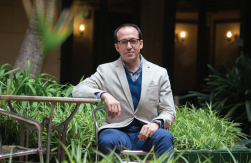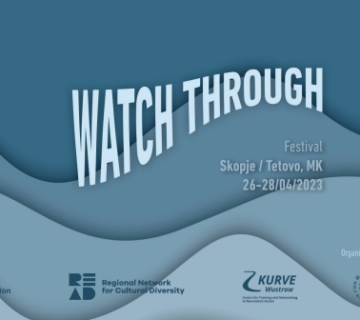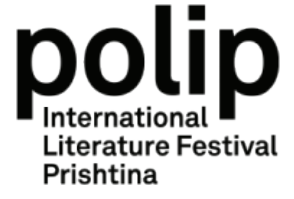Burhan Sönmez is the author of four novels, which
have been translated into forty languages. He was born in
Turkey and grew up speaking Turkish and Kurdish. After
working as a lawyer in Istanbul, Sönmez went to Britain
as a political exile. His writing has appeared in newspapers
including The Guardian, Der Spiegel, Die Zeit, and La
Repubblica. Besides writing, he has translated the poetry
book The Marriage of Heaven and Hell by William Blake
into Turkish. Burhan Sönmez has received Vaclav Havel
Library Award in 2017 and the EBRD Literature Prize
in 2018. He is President of PEN International. We are
publishing here the full text of his keynote speech delivered at
the opening of WATCH THROUGH Festival.
The word peace, unfortunately, is not humanity’s oldest word. Because if there arose
a need for the word peace, that means there had been war before. The word that
preceded peace was war, so what was the word before that?
Every writer carries within them the dream of humanity’s first unknown word and
lives with the hope of creating the newest one. There are two questions here: what
will be humanity’s next new word? And, who will create that?
Eighty-three years ago, German-Jewish philosopher Walter Benjamin was running
away from Nazis, trying to cross from France to Spain and from there to the United
States. The Spanish border guards told him he couldn’t cross. Benjamin would either
be caught by the trailing Nazis, or he should follow another option. He chose the
second option and committed suicide.
Walter Benjamin had a black leather bag with him. The roads were steep and
Benjamin was in poor health. At a time when he was feeling helpless, his friends told
him to leave the bag. But he strongly objected. He said that he could stay, but the bag
had to cross the Atlantic. After Benjamin died, his bag was lost. We don’t know
what’s in that bag. Manuscripts? Or something else?
In the same year, at the beginning of the Second World War, H. G. Wells, the second
president of PEN International, stated in his book The Rights of Man that our aim
should be to save people from fear. Saving people from the fear of pain, fear of
hunger, fear of war… In order to accomplish this, it was necessary to establish a
system that allows people to live happily together.
My organisation PEN International was founded with this dream just after the First
World War in 1921; since then, for over hundred years, we have been fighting to
promote literature and defend freedom of expression. Because freedom is essential
for writers and all humanity, we are trying to keep this power alive and strong despite
all oppressions.
We have been saving lives, thanks to the writers, journalists, publishers for their
solidarity. Thanks to the help of those international institutions, that in the last two
years we undertook the biggest relocation operation of our history and brought to
safety more than 100 writers and their families from Afghanistan, Belarus,
Nicaragua, Uganda and beyond.
We work with 140 PEN centers in more than 100 countries.
However, the first half of the 20th century was filled with the pain of two world
wars; the second half was full of efforts to overcome it. The establishment of the
United Nations (1945) and the Council of Europe (1949) and the forming of the
Universal Declaration of Human Rights (1948) and the establishment of The
European Court of Human Rights (1959) were the results of learning from history
and long debates around the world. PEN International was an active part of these
developments.
History is said to be the best teacher, but people don’t seem to be the best students.
In the 21st century, authoritarianism is rising again, erecting new walls between
societies and bigotry is becoming the favourite tool in responding to the problems.
Populist ideas are gaining ground in every continent, especially Europe. Many
countries are trying to undermine the humanitarian basis of international institutions.
We are moving away from the dream of a peaceful world. Even the word democracy
is taken for granted in many places and is clearly misused.
We know the traditional methods of oppression. Methods such as prison,
assassination and censorship are still popular everywhere, but new methods of
oppression are also developing and besieging our lives. Hate speech, fake news, and
privacy-destroying surveillance are growing across the world.
George Orwell described traditional methods in his novel 1984, defining societies
destroyed by oppression. Aldous Huxley showed the different methods of repression
in his novel Brave New World and described the rulers’ tendency towards new
practices based on the consent and pleasure of individuals, not the forceable methods
of governments.
Now we are in a period where these two methods of oppression go together.
When we look at today's social media networks and the amount of information for
propaganda, we see how the truth can be blurred and replaced by the invasion of
misinformation. Many people and institutions become a voluntary part of this
process, spreading lies and conspiracy theories, and almost greedily destroying what
we call truth.
We know that “Big Brother” is watching us. There is no longer such a thing as a
private life. Everything is in the data centres of corporations, and our every word is
targeted by the censorship guards.
Today we live in a period where truth is corrupted, disintegrated and destroyed in a
poisonous air and new walls are erected between nations, cultures, and people.
Harold Pinter, stated in his speech for Nobel Prize in Literature (2005) as follows:
“There are no hard distinctions between what is real and what is unreal, nor between
what is true and what is false. A thing is not necessarily either true or false; it can be
both true and false. I believe that these assertions make sense and do apply to the
exploration of reality through art. So as a writer I stand by them – but as a citizen I
cannot. As a citizen I must ask: What is true? What is false?”
As Harold Pinter says, we can play with the truth and false in the arts as we wish, but
as free citizens of this world, we want the truth in our lives.
Against the power of freedom, authoritarian forces are not limited to one corner of
the world, and they encourage the most primitive ways of oppression and
discrimination. We suddenly feel as if we have gone back in history and are in the
political blindness that surrounded the world a hundred years ago.
We are bumping into walls everywhere, walls that are in different forms. One wall
says “Hate your neighbour” while the other says “Destroy the planet for your greedy
self-interest”.
A wall is a dark screen to hide the truth behind it. This dark wall can be built only by
two forces, one is violence the other is lying.
We know how it works across the world and also here against people in North
Macedonia.
We know that the cultural heritage of North Macedonia is labelled as artificial and
falsified. The political denials and conditioning of identities in societies are contrary
to the principles of fundamental human rights, the rights of states and members of the
UN embedded in the UN Charter, as well as contrary to the principles embedded in
the Charter of PEN International. These measures are necessary to develop co-
operative relations among different ethnicities and cultures in North Macedonia and
the Balkan states based on respect for the principle of equal rights, to maintain
international peace and security.
Freedom of expression does not mean insulting others but showing that other
opinions are possible. If you don’t agree with this, simply bring another opinion
forward – no need to resort to hate speech or violence.
We writers often use the word freedom, so we appear to be interested in politics.
In fact, not to be silent in the face of oppression is not to be political in the traditional
sense, but to be against intolerance, bigotry and authoritarianism.
Against the politics that separate us with walls and create rigid societies, today we
say: “Walls separate, books unite.”
Writing and publishing books is thought to be easy, but it often becomes a difficult
and dangerous job.
The author is not an important person by the normal standards of everyday life. We
are not doing anything big, we are just writing a book, publishing a poem. But then
politicians come out and say "Books are dangerous" and target us. While we don’t
attach importance to ourselves because of the book we write, the governments give
us this importance, showing that what we do is not an ordinary job.
Time flows in two ways, one fast and the other slow. In fast-flowing time, power can
win against us, they can censor us, oppress us. But in the slow flowing time, our
words, our writings always live and go beyond the borders of time.
Could they destroy Socrates? When they burnt the books of Jean-Jacques Rousseau
or Averroes or James Joyce, did they manage to erase their names from history?
Today in many countries, sadly, in so many countries writers are being targeted
again. A PEN member (Abdullah Atefi) was murdered two years ago in Afghanistan,
a PEN member a young poet (Ko Jimmy) was executed by hanging in Myanmar last
year, an activist (Osman Kavala) was sentenced to life in prison in Turkey last year, a
PEN member and Nobel laureate (Ales Bialiatski) was sentenced ten years in prison
last month in Belarus.
Beyond these dreadful examples we are trying to help more than a thousand writers
every year. That is not a good picture for our civilisation, in the 21 st century of
humanity.
Those writers we are trying to help are mostly in prison or on the run as immigrants
in other countries. I myself an immigrant lived in exile about ten years. Benjamin
was an immigrant too, he died on the border.
Today we are at another important verge, a turning point in history. We will either
voluntarily enter into an Animal Farm or ask for another world to be built.
Oscar Wilde once said, “A map of the world that does not include Utopia is not worth
even glancing at…”
People may think that Utopia belongs to an unknown, distant time. We need to bring
it in the current moment; because Utopia is not “the place that cannot exist”, it is “the
place that should be made to exist.”
That is our ultimate dream: to create one humanity living in peace and equality.
Although we are born within the borders of a certain country, we are citizens of the
world that is opened beyond borders and walls.
We should keep the dialogue alive and develop cultural relations between nations.
Our claim is quite simple: We claim time – the time of freedom, time of love, and
time of peace. We write novels and poems to celebrate the value of this beautiful
time for humanity.
But what are we creating all together and what are we leaving behind us for the next
generations? What is our new word for the future of humanity? In this age, when the
future becomes fully endangered, what can we say to the children coming after us?
Surely, the first thing we must do is to trust new generations. And we have to work to
deserve their trust. If they don’t trust us, if they are not happy about what we do, then
it is our responsibility to correct things and leave the world in better conditions for
them.
Censorship or prison or exile is not what we are afraid of. We are only afraid of
losing what we have created, that is why Walter Benjamin’s black leather bag is
valuable for us.
We don’t know what Benjamin was carrying in that bag. Maybe he found the oldest
word that was created by humanity… Maybe the oldest and the most beautiful word
was in his bag and it is now lost again. It is our job and responsibility to find that
word and present it to the next generations for a peaceful future.
At a time when bad news is spreading all over the world and we are blinded by
pessimistic views, I believe that our job is to raise hope. Literature is hope. And
Literature is freedom.



